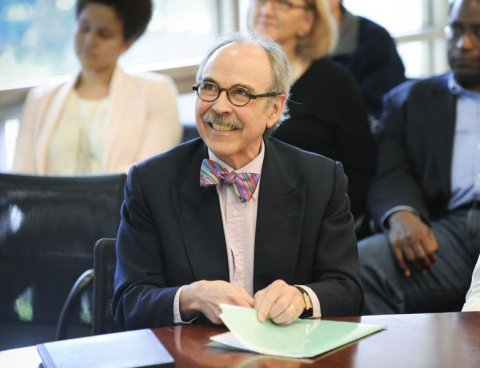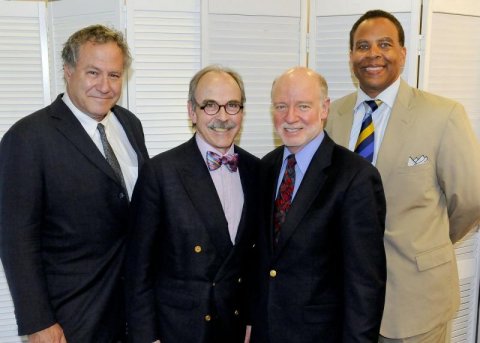William H. Janeway is senior advisor at Warburg Pincus. He joined Warburg Pincus in 1988 and was responsible for building the information technology investment practice. Previously, he was executive vice president and director at Eberstadt Fleming. Dr. Janeway is a director of Magnet Systems, Nuance Communications, and O'Reilly Media, and a member of the board of managers of Roubini Global Economics.
Dr. Janeway is chairman of the board of trustees of Cambridge in America, University of Cambridge, and a member of the board of managers of the Cambridge Endowment for Research in Finance (CERF). He is a member of the board of directors of the Social Science Research Council, the board of governors of the Institute for New Economic Thinking, and the advisory boards of the Princeton Bendheim Center for Finance and the MIT-Sloan Finance Group.
Slate.com has heralded Dr. Janeway’s most recent book, Doing Capitalism in the Innovation Economy as “The one book on Wall Street you haven’t read—but should.”
On March 27, 2013, William H. Janeway visited USC Annenberg, and presented key arguments from his new book "Doing Capitalism in the Innovation Economy" (Cambridge, 2012) at an M{2e} Research Seminar on 'Media, Money, and Society'. Christopher Holmes Smith, Co-Director of USC Annenberg's M{2e} program, caught up with Dr. Janeway for a follow-up conversation about prospects for U.S. leadership in the next information age.

The specific catalyst was a conversation with my good friend Richard Sennett, a great and broadly engaged social scientist. More generally, the global financial crisis of 2008 and its radical discrediting of "Market Fundamentalism" created both the possibility and the need to set the processes that drive economic development through technological innovation into the relevant institutional and historical context.
One of your chief arguments in the book is that "efficiency" is a dangerously overrated concept in economics. Can you elaborate on that point for our readers?
Efficiency is the enemy of innovation at the systemic level, given that upstream (scientific research and technical invention) and downstream (the exploration of new economic space), progress is achieved through trial and error. The pursuit of efficiency also cripples government efforts to offset contraction in the private sector and to minimize the unnecessary waste of unemployed resources. At the level of the firm, a delicate and dynamic balance is required between managing cash flow to hedge against unanticipated events and sponsoring enough experimentation to thrive in the innovation economy.
You say that, to ensure the long-term viability of the Innovation Economy, it is paramount that we rediscover government's role as a legitimate economic actor. Where does the U.S. stand in this regard, five years after the financial crisis? In what sector of the economy should the U.S. government focus the majority of its supply-side muscle?
The role of the state in the US remains crippled by a long generation of ideological effort to discredit the state as an economic actor and to elevate the "market" as the sole legitimate instrument for allocating resources and distributing income and wealth. Politicians (Reagan and successors) were empowered by academics (Friedman and successors) while those in the center and the left were inhibited by the failures of Great Society over-reaching from Vietnam to the poverty programs and then in the face of the stagflation generated by the first oil shock of the 1970s. The most pressing need for state support of innovation lies in the needed scientific research and technological development to advance the "low carbon" sustainable economy of the future. Note that, in addition to funding research, the state can serve as an early customer of innovative products not yet ready for commercial competition: this is exactly the role played by the Defense Department in the early decades of the digital revolution. However, for this to happen on a large scale will require emergence of a political consensus about the need for robust state-led responses to climate change that is not visible in the United States today.
You write that the Innovation Economy requires a greater degree of symbiosis between what you call "Schumpeterian Waste" & "Keynesian Waste." Have you given much thought to how the Chinese are striving for a balance between these two factors? Indeed, what correlations can we draw from your book to other markets around the world?
China has demonstrated how rapidly an authoritative state can drive and sponsor the process of catching up to the innovative frontier (see Gershenkron). I make this distinction between the "follower" and the "frontier": followers in the innovation economy have had a clear path forward followed by all developing nation-states from the US: mercantilist policies of protection and subsidy. These can be observed historically among all the nations of East Asia, beginning with Japan well over 100 years ago. At the frontier, however, the challenge is very different. The national champions must be rendered subject to competitive attack. Entrepreneurial failure must be tolerated...even celebrated. And when we consider the next, low carbon New Economy, everyone is at the frontier.
In your talk at USC Annenberg you mentioned that "Venture Capital is a craft and not a science." What were you driving at there? Has the mythology of the heroic VC outstripped reality?
Yes, the heroic myth of VC has outstripped statistically observable reality. The three stylized facts of VC - tremendous skew in returns across funds, persistence in returns at the firm level, and close correlation with the public equity markets (especially the market for IPOs) - are the basis for my assertion that venture capital is a craft, not an industry.

The computer/internet/mobile new economy has many decades to run. The technological pessimism of Professor Robert Gordon of Northwestern and other, less distinguished advocates, is misconceived. The rapid advance from speech recognition to natural language understanding, coupled with the maturation of "the cloud/mobile" environment as the fourth generation of computing architectures is already opening up new applications of transformational significance: the "intelligent assistant" who can not only find relevant information but execute transactions is just one example. There is tremendous momentum in the private sector across the developed and developing world to press forward on multiple fronts (Africa is the testing ground for novel mobile payment systems, leapfrogging both the banking systems and wired networks that do not exist).
The fruits of the Innovation Economy in the digital age are becoming evermore concentrated. What can be done to broaden access to opportunity?
The processes of creative destruction continue to play out. Five years ago Nokia and Motorola ruled the mobile world, with Blackberry as the leader in the enterprise market. Where are they now? Plus the maturation of open source technologies and access to cloud-based computing and storage resources on an as needed basis has radically reduced the cost of development for new start-ups. Even Apple's extraordinary success is beginning to look transient in the post-Jobs age.
Where in the TMT sector do you see the most growth potential?
Extraction of meaning and intent from big unstructured data.








